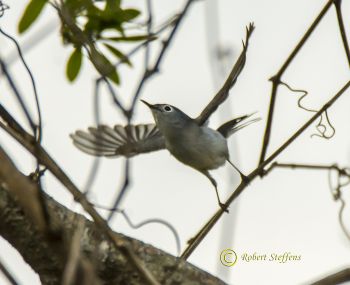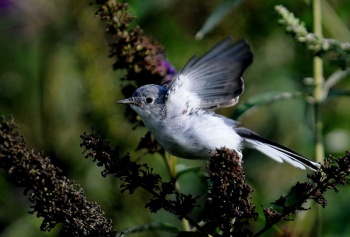(Photo of juvenile) |
(add audio) |
||
| (13 intermediate revisions by 7 users not shown) | |||
| Line 1: | Line 1: | ||
| − | [[Image:Blue- | + | [[Image:Blue-gray_Gnatcatcherg.jpg|thumb|550px|right|Male<br />Photo by {{user|gophish|gophish}}. <br /> Vischer's Ferry, [[New York]], [[USA]]]] |
;[[:Category:Polioptila|Polioptila]] caerulea | ;[[:Category:Polioptila|Polioptila]] caerulea | ||
==Identification== | ==Identification== | ||
| Line 5: | Line 5: | ||
Smaller than a sparrow. Tiny, slender, long-tailed bird, blue-gray above and white below, with white eye ring and broad white borders on black tail. | Smaller than a sparrow. Tiny, slender, long-tailed bird, blue-gray above and white below, with white eye ring and broad white borders on black tail. | ||
====Similar Species==== | ====Similar Species==== | ||
| − | Looks like a miniature [[:Northern Mockingbird| | + | [[Image:607-01590fg2 Nonbreeding Eastern Blue-Gray Gnatcatcher.jpg|thumb|350px|right|Non-breeding (Eastern) <br />Photo by {{user|bobsofpa|bobsofpa}}<br />Big Cypress National Preserve, [[Florida]], [[USA]], February 2007]] |
| + | Looks like a miniature [[:Northern Mockingbird|Mockingbird]]. | ||
| + | |||
==Distribution== | ==Distribution== | ||
Breeds from northern [[California]], [[Colorado]], southern Great Lakes region, southern [[Ontario]], and [[New Hampshire]] southward to [[Guatemala]]. Winters from southern [[California]], Gulf Coast, and Carolinas to [[Honduras]] and the [[Greater Antilles]]. | Breeds from northern [[California]], [[Colorado]], southern Great Lakes region, southern [[Ontario]], and [[New Hampshire]] southward to [[Guatemala]]. Winters from southern [[California]], Gulf Coast, and Carolinas to [[Honduras]] and the [[Greater Antilles]]. | ||
==Taxonomy== | ==Taxonomy== | ||
| − | + | ====Subspecies==== | |
| − | ====Subspecies | + | This is a [[Dictionary_P-S#P|polytypic]] species, consisting of eight subspecies<sup>[[#References|[1]]]</sup>: |
| − | This is a [[ | ||
*''P. c. caerulea'' (Eastern): | *''P. c. caerulea'' (Eastern): | ||
:*Eastern and central [[US]] to Gulf Coast; winters to north-eastern [[Mexico]] and [[West Indies]] | :*Eastern and central [[US]] to Gulf Coast; winters to north-eastern [[Mexico]] and [[West Indies]] | ||
| − | '''Western Group''' | + | '''Western Group''' |
| + | [[Image:072508juvieBGGnatcatcher1a.jpg|thumb|350px|right|Juvenile<br />Photo by {{user|KC+Foggin|KC Foggin}}<br />Myrtle Beach, [[South Carolina]], July 2008]] | ||
*''P. c. amoenissima'': | *''P. c. amoenissima'': | ||
:*South-western [[Oregon]] to northern Baja and northern [[Mexico]]; winters to southern Mexico | :*South-western [[Oregon]] to northern Baja and northern [[Mexico]]; winters to southern Mexico | ||
| Line 25: | Line 27: | ||
*''P. c. deppei'': | *''P. c. deppei'': | ||
:*Eastern [[Mexico]] (San Luis Potosí to Veracruz, Tabasco and northern Chiapas) | :*Eastern [[Mexico]] (San Luis Potosí to Veracruz, Tabasco and northern Chiapas) | ||
| − | |||
*''P. c. mexicana'': | *''P. c. mexicana'': | ||
:*South-eastern [[Mexico]] (Yucatán Peninsula) | :*South-eastern [[Mexico]] (Yucatán Peninsula) | ||
*''P. c. cozumelae'': | *''P. c. cozumelae'': | ||
:*Cozumel Island (off eastern [[Mexico]]) | :*Cozumel Island (off eastern [[Mexico]]) | ||
| + | |||
==Habitat== | ==Habitat== | ||
| + | [[Image:BLGRYGNTCTCHR 1869.jpg|thumb|350px|right|Photo by {{user|mali|mali}}<br />Fuquay-Varina, [[North Carolina]], [[USA]], 2014]] | ||
Deciduous woodlands, streamside thickets, live oaks, pinyon-juniper, chaparral. Coastal sage scrub and gardens. | Deciduous woodlands, streamside thickets, live oaks, pinyon-juniper, chaparral. Coastal sage scrub and gardens. | ||
==Behaviour== | ==Behaviour== | ||
| + | [[File:Blue-gray_Gnatcatcher_Flight_STF.jpg|thumb|350px|right|Frontal Perspective<br />Photo © by {{user|STEFFRO1|Robert Steffens}}<br />[[Huntington Beach State Park]], [[South Carolina]], [[USA]], 15 April 2021]] | ||
| + | Hyperactive and hard to capture, gleams insects of shrubs and trees, acts like a wren. | ||
====Breeding==== | ====Breeding==== | ||
The clutch consists of 4 or 5 brown-spotted pale blue eggs laid in a small, beautifully made cup of plant down and spider webs, decorated with flakes of lichen and fastened to a horizontal branch at almost any height above ground. | The clutch consists of 4 or 5 brown-spotted pale blue eggs laid in a small, beautifully made cup of plant down and spider webs, decorated with flakes of lichen and fastened to a horizontal branch at almost any height above ground. | ||
====Vocalisation==== | ====Vocalisation==== | ||
Song is a thin, musical warble. Call note a distinctive, whining'' pzzzz'', with a nasal quality. | Song is a thin, musical warble. Call note a distinctive, whining'' pzzzz'', with a nasal quality. | ||
| + | |||
| + | '''Song'''. There is Blue Gray Gnatcatcher at seconds 1.5-3.5 and again at 11-the end. Other species heard are White-eyed Vireo, a short call around second 5, and weak sounds from Tufted Titmouse several places. If anyone has a better recording, please replace this one!<br /> | ||
| + | |||
| + | {{Audio|2023-05-02 1136 BGGn w WeVi Tuti q2.mp3}} | ||
| + | |||
| + | Recording © by {{user|NJLarsen|NJLarsen}}, Caw Caw Interpretive Center, [[South Carolina]], [[USA]], 2 May 2023. | ||
==References== | ==References== | ||
| − | #{{Ref- | + | #{{Ref-Clements6thAug19}} |
{{ref}} | {{ref}} | ||
==External Links== | ==External Links== | ||
| − | {{GSearch|Polioptila | + | {{GSearch|"Polioptila caerulea" {{!}} "Blue-gray Gnatcatcher"}} |
| + | {{GS-checked}}1 | ||
| + | <br /> | ||
| + | <br /> | ||
[[Category:Birds]][[Category:Polioptila]] | [[Category:Birds]][[Category:Polioptila]] | ||
| + | [[Category:Bird Songs]] | ||
Latest revision as of 19:59, 29 May 2023
- Polioptila caerulea
Identification
4 1/2 -5" (11-13 cm)
Smaller than a sparrow. Tiny, slender, long-tailed bird, blue-gray above and white below, with white eye ring and broad white borders on black tail.
Similar Species
Looks like a miniature Mockingbird.
Distribution
Breeds from northern California, Colorado, southern Great Lakes region, southern Ontario, and New Hampshire southward to Guatemala. Winters from southern California, Gulf Coast, and Carolinas to Honduras and the Greater Antilles.
Taxonomy
Subspecies
This is a polytypic species, consisting of eight subspecies[1]:
- P. c. caerulea (Eastern):
- Eastern and central US to Gulf Coast; winters to north-eastern Mexico and West Indies
Western Group
- P. c. amoenissima:
- P. c. obscura:
- Southern Baja California (28°N to Cape District)
- P. c. gracilis:
- Foothills of north-western Mexico (south-eastern Sonora)
- P. c. nelsoni:
- Southern Mexico (Guerrero to Oaxaca and southern Chiapas)
- P. c. deppei:
- Eastern Mexico (San Luis Potosí to Veracruz, Tabasco and northern Chiapas)
- P. c. mexicana:
- South-eastern Mexico (Yucatán Peninsula)
- P. c. cozumelae:
- Cozumel Island (off eastern Mexico)
Habitat
Deciduous woodlands, streamside thickets, live oaks, pinyon-juniper, chaparral. Coastal sage scrub and gardens.
Behaviour

Photo © by Robert Steffens
Huntington Beach State Park, South Carolina, USA, 15 April 2021
Hyperactive and hard to capture, gleams insects of shrubs and trees, acts like a wren.
Breeding
The clutch consists of 4 or 5 brown-spotted pale blue eggs laid in a small, beautifully made cup of plant down and spider webs, decorated with flakes of lichen and fastened to a horizontal branch at almost any height above ground.
Vocalisation
Song is a thin, musical warble. Call note a distinctive, whining pzzzz, with a nasal quality.
Song. There is Blue Gray Gnatcatcher at seconds 1.5-3.5 and again at 11-the end. Other species heard are White-eyed Vireo, a short call around second 5, and weak sounds from Tufted Titmouse several places. If anyone has a better recording, please replace this one!
Recording © by NJLarsen, Caw Caw Interpretive Center, South Carolina, USA, 2 May 2023.
References
- Clements, J. F., T. S. Schulenberg, M. J. Iliff, S. M. Billerman, T. A. Fredericks, B. L. Sullivan, and C. L. Wood. 2019. The eBird/Clements Checklist of Birds of the World: v2019. Downloaded from http://www.birds.cornell.edu/clementschecklist/download/
Recommended Citation
- BirdForum Opus contributors. (2024) Blue-gray Gnatcatcher. In: BirdForum, the forum for wild birds and birding. Retrieved 7 May 2024 from https://www.birdforum.net/opus/Blue-gray_Gnatcatcher
External Links
GSearch checked for 2020 platform.1







